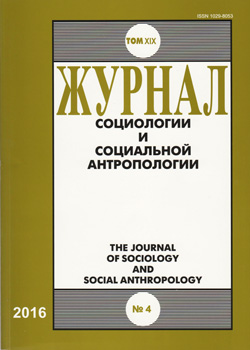Историческая социология власти Майкла Манна
Ключевые слова:
Майкл Манн, историческая социология, власть, сети, государство, цивилизация, империя
Аннотация
Майкл Манн — один из ведущих современных исторических макросоциологов. Согласно его теории источников социальной власти, общества являются не структурированными и унитарными системами, а нежесткими композитами из накладывающихся, пересекающихся и несовпадающих сетей власти. Власть — это универсальное средство для достижения любых человеческих целей путем овладения окружающей средой. Власть не сводится к ее эксплуататорскому аспекту, сотрудничество позво ляет увеличить коллективную власть над третьей стороной или над природой. Выделяются четыре измерения власти: авторитетность, диффузность, интенсивность, экстенсивность, характеризующие централизованную / децентрализованную природу субъекта власти, широту / глубину воздействия власти. Четырьмя источниками власти выступают: идеологические, экономические, военные и политические отношения кооперации или конфликта между людьми. На протяжении истории происходит развитие социальной власти (возможностей) человечества. Это развитие носит не эволюционный, а «интерстициальный характер», который обусловлен несовпадением сетей власти, несовершенством перехода человеческих целей в организационные средства, непреднамеренными последствиями социального действия, историческими случайностями. Одной из центральных тем исторической социологии Манна выступает исторический рост мощи и трансформация государств, а также влияние, оказываемое этим процессом на все прочие организации власти. В обмен на рост возможностей цивилизация и государство запирают прежде подвижное население в «клетку». Возникновение первых государств связано с аккумуляцией, централизацией и защитой ресурсов ирригационного земледелия и торговли поблизости. Последующая диалектика древних империй «принудительной кооперации» и «цивилизаций с множеством акторов власти» развивает экстенсивную и интенсивную власть государств, соответственно. Транснациональная идеология мировых религий (в частности христианство) привносит нормативное регулирование в геополитические отношения между феодальными государствами. Возросшая сплоченность правящих классов и «военная революция», увеличившая потребности в экономических и людских ресурсах, толкают государства к проникновению вглубь гражданского общества, т. е. повышают его «инфраструктурную власть» ценой ослабления «деспотической власти» и относительной автономии.
Опубликован
2016-08-20
Как цитировать
Карасев, Д. (2016). Историческая социология власти Майкла Манна . ЖУРНАЛ СОЦИОЛОГИИ И СОЦИАЛЬНОЙ АНТРОПОЛОГИИ, 19(4), 5–23. извлечено от http://jourssa.ru/jourssa/article/view/542
Раздел
Историческая социология

